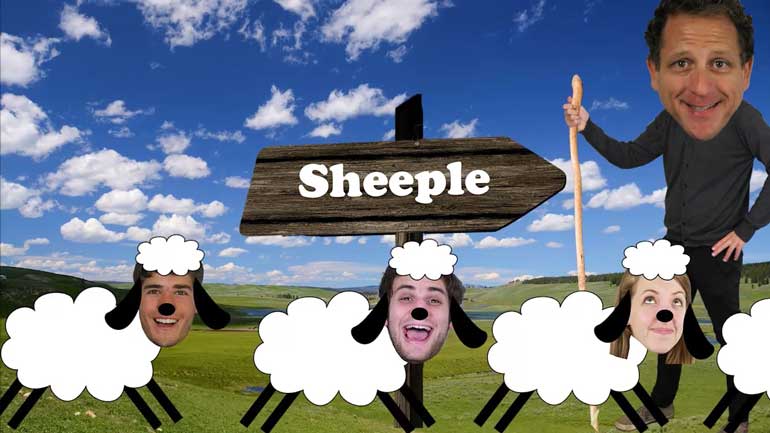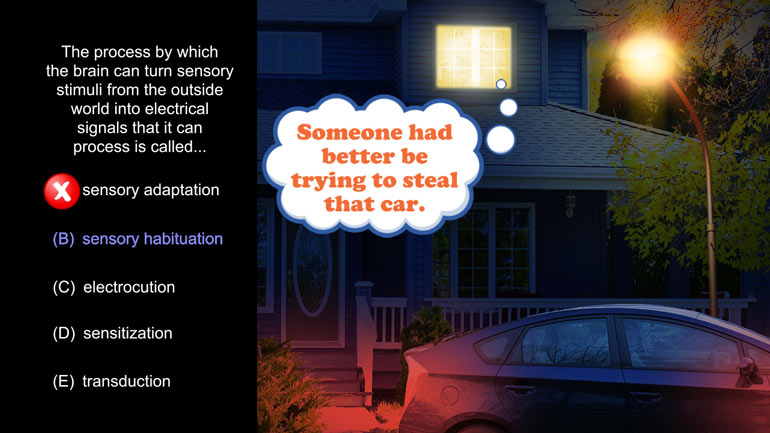ShmoopTube
Where Monty Python meets your 10th grade teacher.
Search Thousands of Shmoop Videos
AP Psychology 1.5 Sensation and Perception 25 Views
Share It!
Description:
AP Psychology 1.5 Sensation and Perception. Where do the optic nerves cross each other on their way into the brain hemispheres?
Transcript
- 00:03
And here's your shmoop du jour brought to you by optic nerves [eye balls dangling across each other]
- 00:07
crossing each other and then double crossing each other in the summers
- 00:10
biggest blockbuster eye versus eye or not. Alright here's our question where do the
- 00:17
optic nerves cross each other on their way into the brain hemispheres, here are your
- 00:22
potential answers.... Alright well there's pretty big spoiler built right into the
Full Transcript
- 00:28
question but the last time we spoiled something our buddies refuse to speak to [Guy holding a Harry Potter book and friends dressed in wizard hats]
- 00:31
us for a month well while we're running from the angry mob let's check out a
- 00:38
diagram of an eyeball alright since we're talking about optic nerves we can [diagram of inside an eye ball]
- 00:43
highlight that part of the diagram and we can see, okay weak pun, well we can see
- 00:48
that there's only one optic nerve per eye. So when we see a question asking about
- 00:53
optic nerves emphasis on nerves.. We know that whatever we're talking about isn't [Diagram of two optic nerves attached to the eye balls]
- 00:59
taking place within the eye itself with that in mind we can easily eliminate A
- 01:04
the fovea we know the fovea centralis refers to a grouping of concentrated [cones appearing out of a persons eye ball]
- 01:10
cones in the eye that are responsible for sharp central vision so we can see
- 01:14
this one through the door and since a blind spot simply refers to an area of [a plane in a cars side mirror]
- 01:18
our visual field that lacks light detecting cells on our retina and not an
- 01:23
actual physiological part of the body we can eliminate this guy too. The rest of [a dog blindfolded]
- 01:29
our answers do fit the not in our eyeball but definitely an actual
- 01:34
physiological thing criteria, funnily enough that's the scientific name for
- 01:38
these guys really you'll find out in ophthalmology school anyway we can [C and D sat in a lecture theatre]
- 01:43
eliminate one of these immediately and that's because we know that Pierre Paul
- 01:46
Broca was a 19th century French physician best known for his research in [Pierre examining a mans mouth]
- 01:50
speech production Broca's area was aptly named because it's a part of the frontal
- 01:56
lobe that is directly linked with speech production not vision that leaves us [image of Pierre's frontal lobe]
- 02:01
with the lateral geniculate nucleus and the optic chiasm but only one of these
- 02:07
guys is where the optic nerves cross each other on their way into the brain
- 02:10
hemispheres and that would be E the optic chiasm
- 02:13
who'd of thunk it right the optic chiasm right there is the space just in front [Two people dangle down a rope from hole]
- 02:19
of the pituitary gland where the optic nerves cross one another through the
- 02:23
brain on their way to the respective lobes and it's actually the only place [Two eyes meet at a dining table]
- 02:27
any parts of each eye really meet, though we here eye-harmony is coming soon and
- 02:32
there's hope for all the lonely hearts out there yet [advert for eye harmony]
Up Next
AP Psychology 2.2 Social Psychology. Which of the following was an independent variable manipulated in Asch's research?
Related Videos
AP Psychology 1.1 Personality. According to Freud, these three parts of personality are constantly in conflict.
AP Psychology 1.1 Sensation and Perception. The process by which the brain can turn sensory stimuli from the outside world into electrical signals...
AP Psychology 1.1 Social Psychology. Which of the following best describes social psychology?
AP Psychology 1.1 States of Consciousness. Who conducted research on REM sleep deprivations?




